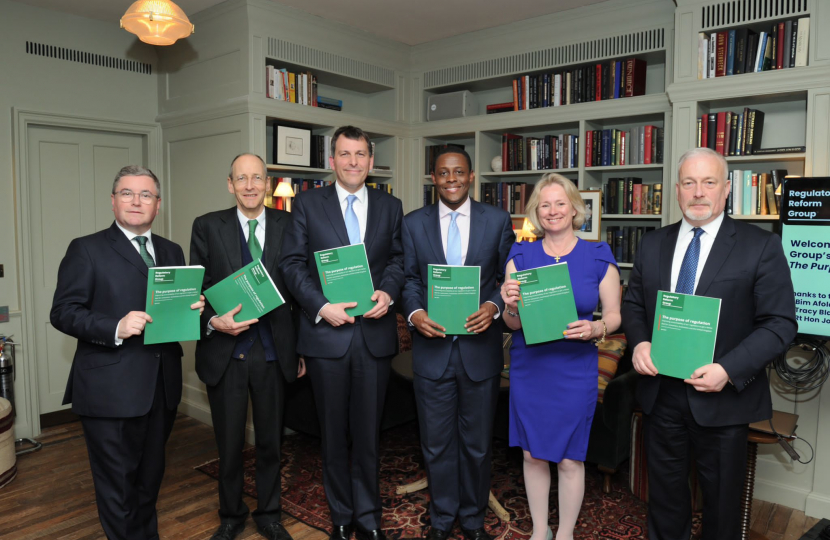
-
Conservative MPs and Peers, including Chair Bim Afolami, Lord Andrew Tyrie, Richard Fuller, Vicky Ford, Alun Cairns, Stephen Hammond, James Wild, Sir Robert Buckland and Mark Garnier lead calls for greater accountability mechanisms to correct the democratic deficit left by Brexit.
-
The new report from the Regulatory Reform Group (“RRG”) suggests the lack of democratic oversight of regulators is holding back UK productivity and economic growth
-
The report includes a recommendation to form a new cross-Parliamentary committee to oversee the performance of regulators
-
This report, The Purpose of Regulation, is set to be launched at an event at which John Glen, Chief Secretary to the Treasury, is to be a key speaker
Prominent Conservatives, including former Ministers and a previous Chair of the Competition and Markets Authority, have called for greater Parliamentary accountability of the UK’s regulators, in a new report.
Their report, The Purpose of Regulation, offers a systematic appraisal of the UK’s regulators covering key economic sectors including energy, housing, and financial services.
The report identifies a number of systemic issues which fall into four main categories:
- a lack of strategic direction to and by the regulators;
- strained regulatory relationships - both between industry and regulators, and between regulators themselves;
- incomplete lines of accountability around the objectives set for regulators and the measurement of regulatory performance, and;
- the need to build up greater skills and knowledge within regulators and support them with sufficient resourcing.
The report points to how powerful lines of Parliamentary accountability across the regulators are essential in order for the UK to realise its long-term growth ambitions.
Chair of the RRG, Bim Afolami MP said: “Unaccountable regulators are directly hindering the UK’s growth prospects. Regulators have the potential to be key drivers of the Government’s long-term ambitions for the UK, not to mention enablers of economic growth, but without adequate oversight from Parliament, this potential has been lost. This report is not proposing that regulatory reform holds all the answers to unlocking growth in the UK, but it is certainly a start.”
The RRG’s report aims to create a new blueprint for regulatory oversight which deals with the immediate issues faced by consumers as well as long-term aims for the UK such as boosting prosperity and tacking challenges such as international competitiveness. The report has also included input of a cross-sectoral Business Advisory Council, chaired by Tracy Blackwell, CEO of the Pension Insurance Corporation, as well as interviews with major trade bodies and regulators themselves.
Tracy Blackwell, Chair of the RRG’s Business Advisory Council, said: “We need to be smarter about how our regulatory regime can best benefit the economy, communities, households, and individuals across the country. As businesses we really do need to ensure stability and growth across the entire economic cycle. The Business Advisory Council aims to complement the work of the Parliamentarians in the RRG by identifying common regulatory issues across sectors, providing specific examples of breakdown, but also helping with an overall, systematic appraisal of our regulatory system - where it works well and what can be improved.”
For example, the report highlights issues in how regulators interact with industry, noting that “the regulator-to-regulated relationship is not always collaborative and can be defined by mistrust, deterring innovation and leading to an excessively risk averse culture.”
The RRG is not promoting slash and burn deregulation, but rather a smarter, and more democratically accountable approach to overseeing regulators to deliver better outcomes for British people and the British economy. The report highlights examples where this has been achieved, arguing for a similar approach to be implemented systematically across the regulatory landscape.
Former Secretary of State Robert Buckland said: “It is important to note that this project is by no means an ideological “race to the bottom” in terms of regulation. All we are seeking is a more transparent and proportionate approach to regulation where, crucially, regulators are held accountable against the objectives they are mandated to deliver.”
One of the report’s primary recommendations is a new committee of both Houses of Parliament, dedicated to standing scrutiny of the UK’s regulators. Rather than duplicate the work of existing Select Committees, this Committee would “take a holistic view of the regulatory environment and understand the impact of regulatory performance on a series of overarching goals including consumer protection, growth and competitiveness, ESG, market stability and risk.”
Richard Fuller, former Economic Secretary to the Treasury, said: “the UK regulatory system is being undermined by a democratic deficit that we have failed to address since Brexit. After leaving the EU, we’ve handed our regulators huge powers over really significant parts of our economy, with little to no democratic oversight of how they are exercising these powers, or way of measuring their performance.”
The report’s other recommendations include:
- establishing a clear definition of a regulator to enable better scrutiny;
- a dedicated ‘Office for Regulation’ in the Cabinet Office, tasked with managing and improving regulatory performance;
- introducing an open, two-way dialogue on regulatory implementation and performance;
- A new ‘accountability framework’, establishing a standardised set of metrics to measure the performance of the UK’s major economic regulators;
- implementing an outcomes-based approach to future regulation.
Former Chair of the Treasury Select Committee and ex-Chair of the CMA, Andrew Tyrie, said: “All of us are now much more vulnerable to rip-offs across regulated industries. Part of the problem - and part of the solution - lies with Parliament. Too many decisions - taken by powerful, anonymous quangos, and affecting millions of people - go scarcely scrutinised and inadequately explained. Parliament must now do more, much more, on behalf of the public, to challenge regulators to perform better. To accomplish this, parliament now needs - at a minimum - a committee dedicated to holding the major regulators to account, supported by enough expertise to make a thorough and authoritative job of it. Parliament needs to expose the extent to which some regulators are failing to fulfil their statutory obligations and duties. And parliament should require early remedies. An era of increasingly anonymous and powerful quangos, often underperforming, has to end.”
The RRG’s formation has been welcomed by the Prime Minister and will go on to look at sectoral issues which have a bearing on the overarching regulatory system, including how regulators are addressing technological change, and the regulation of cross-cutting industries.
ENDS
Notes to editors:
- The Regulatory Reform Group is chaired by Bim Afolami and is composed of Sir Robert Buckland, Alun Cairns, Vicky Ford, Richard Fuller, Mark Garnier, Stephen Hammond, Lord Andrew Tyrie and James Wild. The ultimate aim of the group is to deliver better economic and social outcomes to businesses and citizens, boost competition and unlock innovation, through the better regulation of UK markets.
- The full report, The Purpose of Regulation, can be accessed here. For more information, please contact Nick Faith at [email protected].




